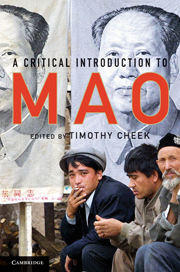Book contents
- Frontmatter
- Contents
- List of Illustrations
- About the Contributors
- Preface
- Acknowledgments
- Timeline of Twentieth-Century China
- Maps
- Part I Mao's World
- 1 Mao, Revolution, and Memory
- 2 Making Revolution in Twentieth-Century China
- 3 From Urban Radical to Rural Revolutionary: Mao From the 1920s to 1937
- 4 War, Cosmopolitanism, and Authority: Mao from 1937 to 1956
- 5 Consuming Fragments of Mao Zedong: The Chairman's Final Two Decades at the Helm
- 6 Mao and His Followers
- 7 Mao, Mao Zedong Thought, and Communist Intellectuals
- 8 Gendered Mao: Mao, Maoism, and Women
- 9 Mao the Man and Mao the Icon
- Part II Mao's Legacy
- Appendix: Selected Further Readings (Annotated)
- Index
- References
5 - Consuming Fragments of Mao Zedong: The Chairman's Final Two Decades at the Helm
Published online by Cambridge University Press: 05 August 2012
- Frontmatter
- Contents
- List of Illustrations
- About the Contributors
- Preface
- Acknowledgments
- Timeline of Twentieth-Century China
- Maps
- Part I Mao's World
- 1 Mao, Revolution, and Memory
- 2 Making Revolution in Twentieth-Century China
- 3 From Urban Radical to Rural Revolutionary: Mao From the 1920s to 1937
- 4 War, Cosmopolitanism, and Authority: Mao from 1937 to 1956
- 5 Consuming Fragments of Mao Zedong: The Chairman's Final Two Decades at the Helm
- 6 Mao and His Followers
- 7 Mao, Mao Zedong Thought, and Communist Intellectuals
- 8 Gendered Mao: Mao, Maoism, and Women
- 9 Mao the Man and Mao the Icon
- Part II Mao's Legacy
- Appendix: Selected Further Readings (Annotated)
- Index
- References
Summary
Every people puts its own scent on its food, and it accepts change only if it can conceal the change from itself, by smothering each novelty in its scent. Optimism about change, whether in politics, economics or culture, is only possible if this premise is accepted.
Theodore Zeldin, An Intimate History of Humanity, 1994Nikita Khrushchev was not to Mao's taste. The Chairman of the Chinese Communist Party (CCP) showed no craving for gulyáskommunizmus. He hungered for something … er … different. In the remarkable art film The Ming Tombs Reservoir Fantasy from 1958 (in which Mao appears briefly in person), we are served a sampling of what it may have been. Set in 1978, ten years after the liberation of Taiwan, with New China well into the “higher phase of communist society [when] … all the springs of co-operative wealth flow more abundantly,” the film has young revolutionaries gathering in the shade of a tree from the branches of which grow bananas, apples, pears, loquats, lizhi … and living among farmers who each rear an average of 365 pigs a day to meet some of the dietary needs of a population that has found a cure for cancer (massive quantities of Turfan grapes) and whose members live to the ripe old age of well past a hundred. It is a unique record of the utopia of Mao's Great Leap Forward, a sweet Chinese dream of plenty.
- Type
- Chapter
- Information
- A Critical Introduction to Mao , pp. 110 - 128Publisher: Cambridge University PressPrint publication year: 2010
References
- 1
- Cited by



